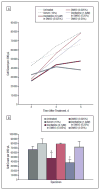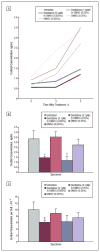Antineoplastic effects of decitabine, an inhibitor of DNA promoter methylation, in adrenocortical carcinoma cells
- PMID: 20231622
- PMCID: PMC3478887
- DOI: 10.1001/archsurg.2009.292
Antineoplastic effects of decitabine, an inhibitor of DNA promoter methylation, in adrenocortical carcinoma cells
Abstract
Hypotheses: Decitabine recovers expression of silenced genes on chromosome 11q13 and has antineoplastic effects in adrenocortical carcinoma (ACC) cells.
Design: NCI-H295R cells were treated with decitabine (0.1-1.0 microM) over 5 days. Cells were evaluated at 24-hour intervals for the effects of decitabine on ACC cell proliferation, cortisol secretion, and cell invasion. Expression was quantified for 6 genes on 11q13 (DDB1, MRPL48, NDUFS8, PRDX5, SERPING1, and TM7SF2) that were previously shown to be underexpressed in ACC.
Setting: Academic research. Study Specimen Human ACC cell line.
Main outcome measures: Adrenocortical carcinoma cell proliferation, cortisol secretion, and cell invasion were measured using immunometric assays. Quantitative reverse transcription-polymerase chain reaction was used to measure gene expression relative to GAPDH.
Results: Decitabine inhibited ACC cell proliferation by 39% to 47% at 5 days after treatment compared with control specimens (P < .001). The inhibitory effect was cytostatic, time dependent, and dose dependent. Decitabine decreased cortisol secretion by 56% to 58% at 5 days after treatment (P = .02) and inhibited cell invasion by 64% at 24 hours after treatment (P = .03). Of 6 downregulated genes on 11q13, decitabine recovered expression of NDUFS8 (OMIM 602141) (P < .001) and PRDX5 (OMIM 606583) (P = .006).
Conclusions: Decitabine exhibits antitumoral properties in ACC cells at clinically achievable doses and may be an effective adjuvant therapy in patients with advanced disease. Decitabine recovers expression of silenced genes on 11q13, which suggests a possible role of epigenetic gene silencing in adrenocortical carcinogenesis.
Figures



Similar articles
-
Pharmacologic reversion of epigenetic silencing of the PRKD1 promoter blocks breast tumor cell invasion and metastasis.Breast Cancer Res. 2013 Aug 23;15(2):R66. doi: 10.1186/bcr3460. Breast Cancer Res. 2013. PMID: 23971832 Free PMC article.
-
Candidate diagnostic markers and tumor suppressor genes for adrenocortical carcinoma by expression profile of genes on chromosome 11q13.World J Surg. 2008 May;32(5):873-81. doi: 10.1007/s00268-008-9521-0. World J Surg. 2008. PMID: 18324346
-
Genome-wide methylation and expression profiling identifies promoter characteristics affecting demethylation-induced gene up-regulation in melanoma.BMC Med Genomics. 2010 Feb 9;3:4. doi: 10.1186/1755-8794-3-4. BMC Med Genomics. 2010. PMID: 20144234 Free PMC article.
-
Decitabine in the treatment of myelodysplastic syndromes.Expert Rev Anticancer Ther. 2010 Jan;10(1):9-22. doi: 10.1586/era.09.164. Expert Rev Anticancer Ther. 2010. PMID: 20014881 Review.
-
DNA methylation in haematological malignancies: the role of decitabine.Expert Opin Investig Drugs. 2003 Dec;12(12):1985-93. doi: 10.1517/13543784.12.12.1985. Expert Opin Investig Drugs. 2003. PMID: 14640942 Review.
Cited by
-
Past, Present and Future of Epigenetics in Adrenocortical Carcinoma.Cancers (Basel). 2020 May 13;12(5):1218. doi: 10.3390/cancers12051218. Cancers (Basel). 2020. PMID: 32414074 Free PMC article. Review.
-
The 'omics' of adrenocortical tumours for personalized medicine.Nat Rev Endocrinol. 2014 Apr;10(4):215-28. doi: 10.1038/nrendo.2013.272. Epub 2014 Feb 4. Nat Rev Endocrinol. 2014. PMID: 24492180 Review.
-
Decitabine induces G2/M cell cycle arrest by suppressing p38/NF-κB signaling in human renal clear cell carcinoma.Int J Clin Exp Pathol. 2015 Sep 1;8(9):11140-8. eCollection 2015. Int J Clin Exp Pathol. 2015. PMID: 26617834 Free PMC article.
-
Therapeutic Targets for Adrenocortical Carcinoma in the Genomics Era.J Endocr Soc. 2018 Sep 26;2(11):1259-1274. doi: 10.1210/js.2018-00197. eCollection 2018 Nov 1. J Endocr Soc. 2018. PMID: 30402590 Free PMC article. Review.
-
Reprogramming human A375 amelanotic melanoma cells by catalase overexpression: Upregulation of antioxidant genes correlates with regression of melanoma malignancy and with malignant progression when downregulated.Oncotarget. 2016 Jul 5;7(27):41154-41171. doi: 10.18632/oncotarget.9273. Oncotarget. 2016. PMID: 27206673 Free PMC article.
References
-
- Schteingart DE, Doherty GM, Gauger PG, et al. Management of patients with adrenal cancer: recommendations of an international consensus conference. Endocr Relat Cancer. 2005;12(3):667–680. - PubMed
-
- Sidhu S, Sywak M, Robinson B, Delbridge L. Adrenocortical cancer: recent clinical and molecular advances. Curr Opin Oncol. 2004;16(1):13–18. - PubMed
-
- Paton BL, Novitsky YW, Zerey M, et al. Outcomes of adrenal cortical carcinoma in the United States. Surgery. 2006;140(6):914–920. - PubMed
-
- Bilimoria KY, Shen WT, Elaraj D, et al. Adrenocortical carcinoma in the United States: treatment utilization and prognostic factors. Cancer. 2008;113(11):3130–3136. - PubMed
-
- Luton JP, Cerdas S, Billaud L, et al. Clinical features of adrenocortical carcinoma, prognostic factors, and the effect of mitotane therapy. N Engl J Med. 1990;322(17):1195–1201. - PubMed
Publication types
MeSH terms
Substances
Grants and funding
LinkOut - more resources
Full Text Sources
Other Literature Sources
Research Materials
Miscellaneous

